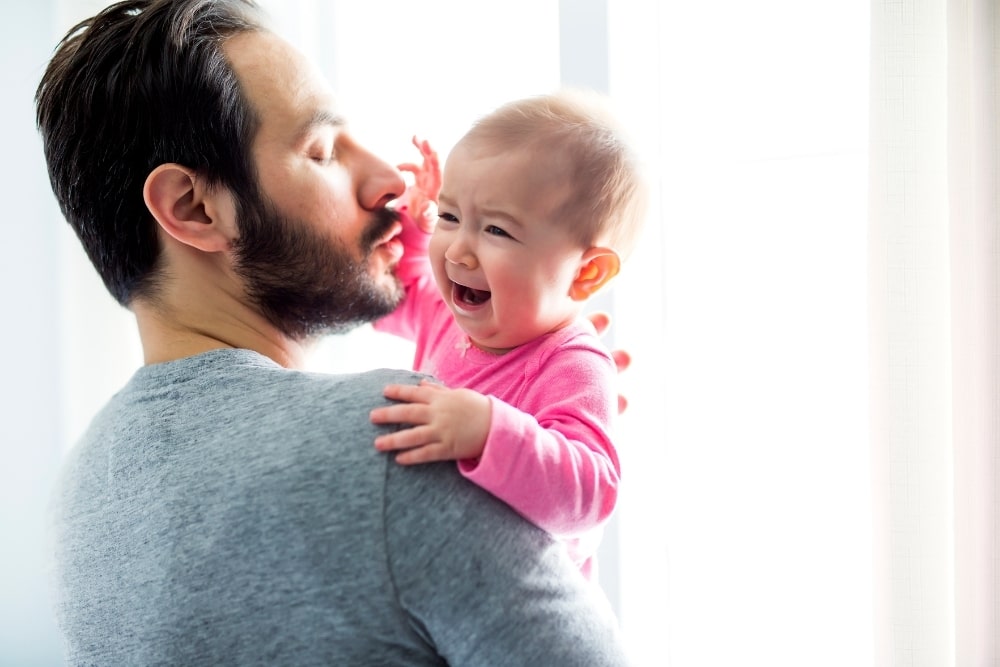Baby’s bodies are still running on very immature systems and this can cause them to do some truly weird and often scary things.
One of these such things is the involuntary spasm or stutter breath that they do after crying. So why does this happen? Is it dangerous? Are there any long-lasting effects?
View in gallery
What Are Sobbing Spasms?
Most if not all of us have either experienced this for ourselves or at least witnessed it in another.
A sobbing spasm or even a stutter breath occurs when the baby gets especially worked up and upset. This same thing also occurs in children and adults.
This little stuttering breath or sobbing spasm is a type of ‘hyperventilation.’ Hyper meaning excessive and ventilation referring to breathing.
The good news is that when these episodes are related to crying they are rarely anything to worry about.
So, What Actually Happens?
Physically
When your baby cries, especially when it is excessive they can easily disturb their normal breathing rhythm, which is normally quite even and controlled.
The muscle that controls your breathing – the diaphragm, tries to return your breathing to normal as the crying episode passes.
As the crying throws your baby’s breathing off a bit, it can deprive them of oxygen or at the very least give them hugely varying levels of oxygen between their sobs.
At this point, their little bodies freak out a little bit and begin prioritizing not dying.
So, in order to return the fine balance to your baby’s breathing your body overcompensates by taking more irregular breaths until it returns to normal.
View in gallery
For adults and older children, the return to normal breathing may take only a few minutes or so, as you can explain to them to breathe deeply which in itself stops the double breathing.
But for a baby who is using immature bodily systems and that you can not explain to them to breathe deeply, it can last for an extended period of time.
Emotionally
When we cry, we must remember that we are releasing a build-up of emotions. These emotions could be happy, sad, angry, frightened, and everything in between.
We cry to release the pent-up emotion and this is the same whether you are a baby, child, or adult.
The only difference being that your baby is unable to tell you what the cause of their upset is, so it will come down to your parental intuition to figure it out.
It may be that they don’t like being left alone, that they were startled, that they are afraid of the dark, or a hundred other things.
Many of these causes can be prevented by using a baby monitor with a two-way intercom or by adding a night light to your baby’s room.
- Multi-functional: Rest combines nightlight, sound machine, and time-to-rise alert in one easy-to-use device that you can control from your phone! Customize color, brightness, sound, and volume level. Set programs to turn off and on automatically based on your family’s sleep schedule.
Prices pulled from the Amazon Product Advertising API on:
Product prices and availability are accurate as of the date/time indicated and are subject to change. Any price and availability information displayed on [relevant Amazon Site(s), as applicable] at the time of purchase will apply to the purchase of this product.
Figuring out the cause of the upset will be key to preventing or at the very least lessening the effects of any further breathing spasms.
Preventing Future Spells
Once your baby’s body matures, they will also develop better coping skills, meaning that they’ll normally grow out of this phase.
As we have said previously actually figuring out what causes the upset will be key to helping you prevent further episodes.
If you do have any concerns about their breathing then you should consult your pediatrician, who will be able to put your mind at ease that what you are witnessing is completely normal.
View in gallery
FAQs
Can crying affect your baby’s lungs?
When your baby experiences intense emotions they do not know how to handle them so they release them through crying.
This may cause them to experience shortness of breath or rapid breathing. This happens because while your baby is stressed the airways between their nose and lungs tighten.
What are sobbing spasms?
Sobbing is a reflex action that occurs due to a spasm of your diaphragm.
Why do babies gasp for air after crying?
These are called cyanotic breath-holding spells and are often triggered by something that upsets the child, like being disciplined or frightened. While crying the baby will breathe out and then doesn’t breathe in for a short while.
The Final Thought
Although it can be extremely frightening to witness your baby gasping and missing their breath, you must try to remember that this is completely normal.
The problem lies in that you can not explain to a baby that if they breathe deeply the problem will correct itself.
Instead, the best we can do as parents is to first try to prevent the issue that causes the upset and if that is not possible, we need to be on hand quickly to comfort our babies.
This in itself will help them to calm down and their breathing to return to normal. If at any point you feel that what your baby is experiencing is not normal then you should seek medical help immediately.






